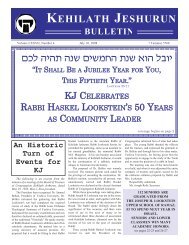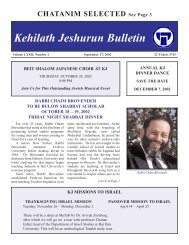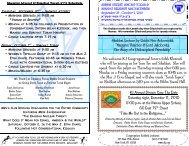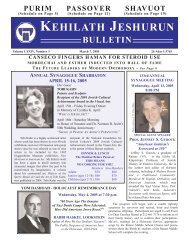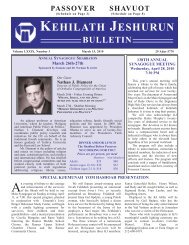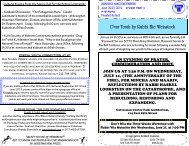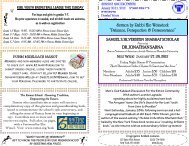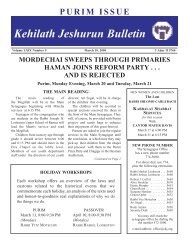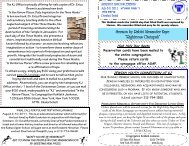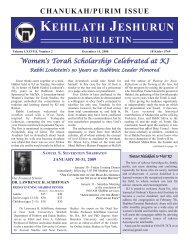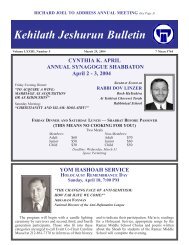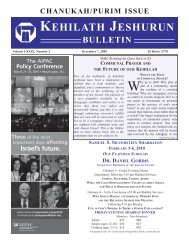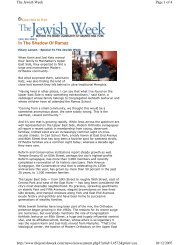Celebrating our 135th year of service - Congregation Kehilath ...
Celebrating our 135th year of service - Congregation Kehilath ...
Celebrating our 135th year of service - Congregation Kehilath ...
You also want an ePaper? Increase the reach of your titles
YUMPU automatically turns print PDFs into web optimized ePapers that Google loves.
Page 14 KEHILATH JESHURUN BULLETIN<br />
Rabbi Meir Soloveichik, Associate Rabbi <strong>of</strong> <strong>Kehilath</strong> Jeshurun, delivered the following sermon on Parshat Beshalach, February<br />
11th, to a packed Main Synagogue:<br />
I was pondering the subject <strong>of</strong> this week's<br />
sermon when I happened upon a startling<br />
story in The New York Sun, with the headline<br />
“Chicken Tastes Supreme After 50 Years in a<br />
Can.” The article, picked up from the British<br />
press, describes an English couple by the<br />
name <strong>of</strong> Mr. and Mrs. Lalley, who got married<br />
in Feb. 1956. For their wedding, they<br />
prepared a hamper <strong>of</strong> what was then the height<br />
<strong>of</strong> post-war luxury: sandwiches, hams,<br />
cheeses and shortbread biscuits. Topping it all<br />
<strong>of</strong>f was: a whole roast chicken preserved in its<br />
own jelly and sealed in a tin. The Lalleys and<br />
their guests gobbled up everything but left the<br />
chicken, which moldered for half a century in<br />
the Lalleys' cupboard. In Feb. 2006, on the<br />
occasion <strong>of</strong> his golden wedding anniversary,<br />
Mr. Lalley celebrated in the best way he knew:<br />
you guessed it. “Our grandchildren were<br />
appalled, begging me not to eat anymore,” he<br />
told the reporter; “but I knew that if it smelled<br />
ok, it wouldn't do me any harm.” Mr. Lalley's<br />
children, now all adults, remember a<br />
childhood punctuated by threats from their<br />
father that he would take the chicken out from<br />
the cupboard and feed it to them. The tin<br />
“disappeared” briefly when the Lalleys<br />
moved, but then, to his relief and the family's<br />
consternation, Mr. Lalley found it behind<br />
some beans. Canning experts interviewed by<br />
the reporter explained that because the<br />
preservation process for canned meats occurs<br />
at 120 C, all microbial causes <strong>of</strong> botulism are<br />
killed and the food can in theory last forever.<br />
In fact, a can was recently recovered from<br />
Capt. Scott's explorations in Antarctica in<br />
1901, and it was still deemed safe. Mr. Lalley<br />
now plans to auction the empty can on ebay.<br />
Our parsha also depicts a singular case <strong>of</strong><br />
food preservation. Moshe and Aaron are<br />
instructed to take some manna and place it in<br />
the Ark in a tzintzenes, an earthenware jar, to<br />
preserve it for generations. This, then, is the<br />
first and perhaps only case <strong>of</strong> canned foods in<br />
the entire corpus <strong>of</strong> the Jewish cannon.<br />
Millenia before canned soup, there was<br />
canned manna; you might say that before<br />
Campbell's there was... Manna-shevitz. Of<br />
c<strong>our</strong>se, it was not the canning process that<br />
provided for the manna’s preservation; after<br />
all, this was the very same substance that<br />
when left overnight, the Torah tells us, quickly<br />
became wormy and rotten. Rather, this<br />
preservation <strong>of</strong> manna in the Ark occurred<br />
miraculously, and when the aron was hidden<br />
“WHAT BRACHA DID THEY SAY ON MANNA?”<br />
BY RABBI MEIR SOLOVEICHIK<br />
before the destruction <strong>of</strong> the First Temple in<br />
the 6th century BCE, the canned manna inside<br />
went with it and is there to this day. And the<br />
question is: why was Moshe commanded to<br />
preserve this one <strong>of</strong> the myriad <strong>of</strong> miracles<br />
from the midbar? Why, upon entering Eretz<br />
Yisrael, was it deemed so important to retain<br />
this reminder <strong>of</strong> the way in which Israel found<br />
sustenance in the desert?<br />
The answer, I think, is that as the Jews<br />
entered the Holy Land, as the miracles so<br />
necessary in the desert providing for their<br />
every need ceased, and as the Jews began to<br />
provide for themselves - tilling the soil,<br />
planting seed, harvesting grain - they needed a<br />
reminder that it is the Almighty that is the<br />
omnipotent provider and sustainer, that the<br />
God who caused the manna to fall is the same<br />
God who causes crops to grow, herds to<br />
increase, and wealth and possessions to<br />
accrue.<br />
Over the past 500 <strong>year</strong>s, poskim have<br />
pondered a critical halakhic question, a<br />
confounding conundrum: what bracha did the<br />
Jews in the dessert say on the manna? You<br />
might say, shehakol; after all, this miraculous<br />
manna did not grow from the ground, nor<br />
from a tree, and usually foods that do not grow<br />
require the recitation <strong>of</strong> shehakol. But <strong>our</strong><br />
parsha describes the manna as lehem, bread,<br />
and the Talmud insists that the beginning <strong>of</strong><br />
<strong>our</strong> bentching was composed by Moshe<br />
misheyarad lahem man, when the manna<br />
began to fall. It is surely inappropriate to<br />
recite shehakol over something deserving <strong>of</strong><br />
bentching! What bracha, then, ought to have<br />
been said? Hamotzi lechem min haaretz?<br />
How can we thank God for taking bread out <strong>of</strong><br />
the ground when the food that we are eating<br />
never grew in the ground?<br />
The enigma is relevant whenever we<br />
consider the halakhic status <strong>of</strong> food that did<br />
not grow in its usual way; tomorrow during<br />
<strong>our</strong> breakfast shiur we will consider the<br />
implications <strong>of</strong> this question regarding the<br />
halakhic status <strong>of</strong> hydroponics. And <strong>of</strong><br />
c<strong>our</strong>se, any <strong>of</strong> us who watches Star Trek<br />
knows that in the twenty-f<strong>our</strong>th century, none<br />
<strong>of</strong> <strong>our</strong> food will come from the ground; rather<br />
it will come from replicators: all we'll need to<br />
do is tell the computer, "tea - earl grey, hot,"<br />
and the molecules needed will instantly<br />
materialize according to <strong>our</strong> own culinary<br />
specifications. So in considering this<br />
question, I'll have you know, we are not only<br />
resolving a historical halachic conundrum, we<br />
are also laying the halakhic groundwork for<br />
Orthodox life on the Starship Enterprise.<br />
So not quite shehakol, not quite hamotzi?<br />
What brakha did they say on the manna? It<br />
was the Rama Mi-Pano, Rabbi Menachem<br />
Azariah <strong>of</strong> Pano, one <strong>of</strong> the Italian rishonim,<br />
who famously suggested that the Jews recited<br />
the following: “baruch ata Hashem… hamotzi<br />
lehem min hashamayim. Blessed are you, O<br />
God, who brings forth bread out <strong>of</strong> Heaven.”<br />
It is a witty suggestion, but it is also pr<strong>of</strong>ound<br />
in that it is the key what the manna<br />
symbolizes: that all sustenance ultimately is<br />
by God's grace. For whether we are<br />
consuming grains grown from the ground, or<br />
meat or milk obtained from an animal, or fruit<br />
plucked from an orchard, whether we are<br />
drinking water, or wine, or whiskey, it is min<br />
Hashamayim; we would not be eating at all<br />
were it not for the gracious hand <strong>of</strong> heaven.<br />
The Shulchan Arukh interestingly states,<br />
in a little-known halakha, that whenever<br />
somebody says hamotzi on bread he ought to<br />
grasp the loaf with all ten fingers, paralleling<br />
the ten-word verse in Ashrei: “Einei kol<br />
eilecha yisabeiru ve-ata notein lahem et<br />
achlam be-ito - The eyes <strong>of</strong> all are turned to<br />
You for sustenance, and You give them their<br />
food in its proper time.” And the point is<br />
pedagogical, not mystical, in nature: when we<br />
are eating food that has not fallen from the<br />
sky, food that we <strong>our</strong>selves have harvested, or<br />
purchased, with <strong>our</strong> own two hands, we are all<br />
too apt to assume that we alone have provided<br />
this abundance, that, in the words <strong>of</strong> the<br />
Torah, kochi ve-otsem yadi asa li et hachayil<br />
hazeh, the power <strong>of</strong> my own hands has created<br />
this wealth, and therefore we must<br />
consciously and deliberately remind <strong>our</strong>selves<br />
that it is not so. It is God that has bestowed<br />
upon us the health to create wealth, and the<br />
fortune to be able to afford food for <strong>our</strong><br />
family, that it is the help received min ha-<br />
Shamayim that has allowed us to be motzi<br />
lechem min haaretz.<br />
God in Sefer Devarim tells us that the<br />
Land <strong>of</strong> Israel is not, for an agrarian society,<br />
optimally situated: Unlike Egypt, it is not<br />
naturally, annually and cyclically irrigated by<br />
the Nile. And this is deliberate, the Almighty<br />
explains; he does not want the Jews to forget<br />
that they are reliant upon God for their every<br />
successful harvest.<br />
If living in an Egyptian agricultural



